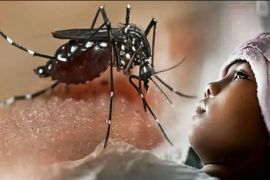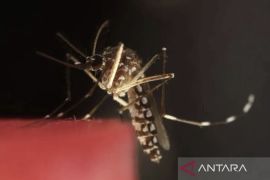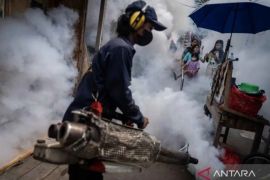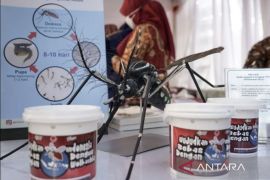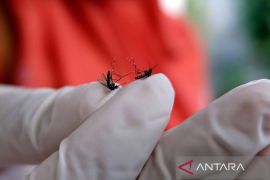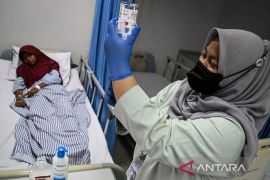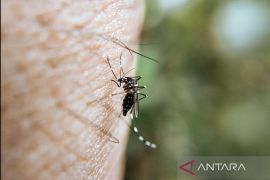Therefore the people across Indonesia should give serious anticipation to the outbreak of the disease, characterized by sudden onset, headache, racking joint pain, and a rash.
Unless the people start to clean up the breeding grounds of the mosquitoes that carry the dengue virus, the disease will undeniably continue to hit part of the country.
To anticipate a possible outbreak of dengue fever, the people must immediately improve the quality of their environments by destroying the breeding grounds of the Aedes aegypti mosquito.
Dengue cases in Indonesia, a tropical country with a fast growing population, increase from time to time as a major killer in the country and therefore people in various provinces have been warned to remain vigilant.
In Riau province, 63 people since January 2011 were reported to have died of dengue fever.
"Of 2,698 dengue cases from January to December 2011, 63 people have died of the disease," Riau provincial health service spokesman Andra Syafril said in Pekanbaru over the weekend.
Andra said since dengue case was declared as and extraordinary event in November 11, 2011, it continued to increase in the districts of Kampar, Pelalawan, Indragiri Hilir, Rokan Hilir, Rokan Hulu, Kuantan Sengingi, Siak.
Meanwhile, Bengkulu district health office chief Nixon Syahbudin said on Sunday that since January to November 2011 a total of 317 people in the province had been infected by dengue fever with 7 fatalities.
Nixon said the data on the number of dengue cases was discovered after the patients were admitted to a number of hospitals and clinics in several districts across the province.
But he noted that the number of dengue cases in Bengkulu dropped significantly from 353 in 2010 to 317 in 2011.
With the significant decline, provincial health service secretary Jaya Marta said in Bengkulu recently that the province has set itself a target to be free from dengue fever in 2014.
"Starting from 2012 we will focus on mass fogging movement continuously in our effort to make the province free from dengue fever in the next two or three years," Jaya Marta said.
Meanwhile, Jambi city is also dengue fever endemic with the cases continued to increase by 800 with 27 deaths in the past two months.
Jambi city administration spokesman Subhi said on Thursday that the dengue outbreak has been declared as an extraordinary incident in the city.
"Two weeks ago there were 700 cases but now it has increased to 800," Subhi said, adding that in spite of a hundred increase in one week, there was no additional fatality.
Jambi provincial health office spokesperson Irawati Sukandar said in Jambi in November that two sub-districts namely Jambi Selatan and Kotabaru in the province were dengue fever endemic.
"We find out that the two sub-districts are dengue fever endemic after we carry out a special research by involving involving the health research agency of Palembang, South Sumatra," Irawati said.
According to her Jambi Selatan and Kotabaru sub-districts were the breeding ground of dengue fever-carrying mosquitoes because the waterways and reservoirs there were not cared for properly.
Irawati said that as of October 2011, more than 500 people in the two sub-districts were tested dengue fever positive.
Therefor the government has warned the people in various provinces across the country to be wary of the deadly disease during the rainy season at the end of 2011 and through January and February 2012 in the struggle to win the battle against dengue fever.
Dengue is a mosquito-borne viral disease that has become so common among humans that it has in recent years turned into a major international public health concern.
According to a Health Ministry report, more than 157,000 people across Indonesia were infected by dengue fever with more than 1,400, mostly children, having died of the disease in 2010.
Dengue fever was first detected in 1968 in Surabaya, East Java; and Jakarta when more than 50 cases were found at the time and more than half of the victims died of the disease.
Consequently, the Surabaya city`s health office in November this year called on the local community to remain alert to the possibility of dengue outbreaks and other rainy season-related ailments like respiratory tract infection and skin disease.
Local health office chief Esty Martiana Rachmie said in Surabaya recently that the people should be wary of those three diseases in this rainy season.
"Dengue fever, respiratory track infection, and skin disease are lurking during the rainy season at the end of this year and therefore people should be vigilant," Esty said.
In Yogyakarta, local health office has also asked the local community to be wary of dengue fever during the rainy season at the end of 2011 until early next year.
"People have to be wary of dengue fever by regularly cleaning up the drains in front of their houses, ponds, pits, and other objects such as tires, pots, and cans that can trap rain water," Yogyakarta health office spokesperson Tuty Setyowati said recently.
Data from Yogyakarta city health office indicated that there were 434 cases of dengue fever with two fatalities as of September 2011.
"We will continue to increase public awareness and vigilance against this kind of deadly disease, because the absence of awareness and vigilance will increase the dengue fever case," Tuty noted.
Dengue fever is a follow-up of every rainy season and therefore the people should be wary of that deadly disease.
As a precaution before the disease breaks out, the people in various provinces across the country are expected to clean up every waterway, ponds, and the surrounding environment from the dengue fever carrying mosquitoes.
O001/H-NG
Reporter: Otniel Tamindael
Editor: Jafar M Sidik
Copyright © ANTARA 2011
